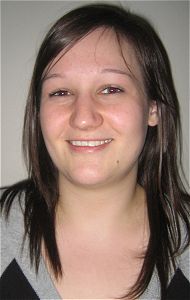
Karen Geoghegan,
runner-up in the BBC’s recent Classical
Star programme is on a mission
to promote the bassoon repertoire.
This, her debut CD, is an ideal starting
point. From the opening bars, the
quality of the recording is self-evident,
with a well balanced and excellently
produced orchestral sound. By the
time the bassoon enters, one is already
immersed in quality, and it is easy
to question whether a young performer
such as Geoghegan can match those
standards.
Not only does she
match them, she surpasses them. Her
sound quality is extraordinary, proving
her argument that the bassoon is deeply
expressive, worthy of being taken
seriously as a solo instrument. The
Hummel concerto is the work that brought
her to Chandos’s attention initially,
during the final of Classical Star,
and this recording leaves no doubt
about the artistry of this exciting
young performer. The faultless technical
work is never a burden - something
often expected from this notoriously
cumbersome instrument - and in Geoghegan’s
hands, the bassoon is agile and flexible.
The slow movement is breathtaking,
with her depth of sound something
that should be experienced by all.
The cadenza is particularly stunning,
with some beautifully resonant low
notes contrasted against a singing
high register. She has an instinctive
feel for phrasing and spacing, using
silence to give extra weight to the
notes she plays. The orchestral playing
is also impressive, with Wallfisch
capably handling the impressive Orchestra
of Opera North. The finale has charm
and personality, and a sense of youthful
enjoyment. This is a fresh, exuberant
performance, which is captivating
from beginning to end.
The Weber that follows
is mysteriously dark in its opening
Andante, and the subsequent
variations are expertly performed.
The Hungarian Rondo has a charming
appeal, with its light-hearted nature
and strong rhythms. The accompaniment
from the orchestra is poised and contained,
giving a perfectly balanced accompaniment,
which features well-presented solo
moments from various wind players.
Geoghegan once again performs with
style and understanding, and a maturity
of musicality which one would not
expect from somebody her age. Her
command of her instrument is truly
remarkable, in both the fast paced
moments, such as the dramatic end
of the work, and in the slower, more
expressive passages.
Berwald’s Concert
Piece follows, composed in 1827
and first performed in the composer’s
native Sweden in the following year.
There is a strong operatic influence
in the writing, and the bassoon takes
on the role of a resonant tenor voice.
The Andante, with its surprising
setting of a famous British tune -
listen to the CD to find out which
one! - is exquisite, performed with
deep-felt expression. The wide leaps
and technical display in the following
variations are equally impressive,
further displaying this young performer’s
breadth of ability.
Not many will have
previously encountered Jacobi. Born
in Germany in 1791, he was a prolific
composer of works for bassoon. Karen
Geoghegan has often spoken about the
multitude of bassoon works which are
not often heard by the general public,
and Jacobi’s works are a prime example
of this. The Introduction and Polonaise
is well constructed and is more usually
heard in a version for bassoon and
piano. This is the world premiere
recording of the orchestral version,
with the sleeve-notes explaining that
the orchestration was copied by bassoonist
William Bailey from an unknown source
in the early twentieth century. The
version works well, and the orchestration
seems natural and carefully balanced.
The piece makes considerable technical
demands of the soloist, played here
with typical evenness and sense of
ease. She proves that the concept
of a virtuoso bassoonist is certainly
not a myth.
Forming a very obvious
contrast, Elgar’s compositional style
suits the bassoon equally well. Composed
later than the other works, in 1910,
it makes use of the expressive qualities
of the instrument, with Geoghegan’s
luxurious sound showing the music
off at its best.
The final track is
an orchestration of Gershwin’s Summertime,
in an arrangement by David Arnold.
This is one of the highlights of the
disc, showing an entirely different
aspect to the bassoon in a way which
reaches out to the listener. Geoghegan’s
sound is ideally suited to this music,
and she has a relaxed jazzy feel,
capturing the essence of the work
and rivalling many jazz singers. The
bassoon has a wonderful vocal quality
in its higher registers, which is
unmissable here. It is perhaps difficult
to include such a well-known and popular
track on a disc such as this, but
it balances nicely with the rest of
the programme and shows the bassoon
in its best possible light.
Despite the obvious
criticisms of reality TV and a culture
of people who try to achieve fame
overnight without the hard work that
goes with it, it is evident that Classical
Star found some real talent. It
is clear that Geoghegan has spent
her life so far working hard and nurturing
her abilities, under the careful guidance
of some excellent teachers, such as
Janet Bloxwich and John Orford. With
a disc such as this, it is impossible
not to take the bassoon, and Karen
Geoghegan, seriously.
Carla Rees
see also interview
with Carla Rees












